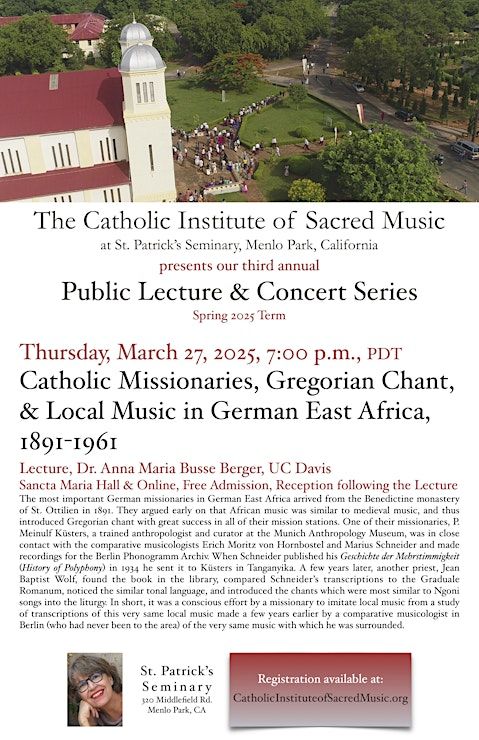
About this Event
Catholic Missionaries, Gregorian Chant, & Local Music in German East Africa, 1891-1961
Lecture, Dr. Anna Maria Busse Berger, UC Davis
Sancta Maria Hall at St. Patrick's Seminary & Online via Livestream
Free Admission
Suggested donation: $30
Reception following the In-person Lecture
The most important German missionaries in German East Africa arrived from the Benedictine monastery of St. Ottilien in 1891. They argued early on that African music was similar to medieval music, and thus introduced Gregorian chant with great success in all of their mission stations. One of their missionaries, P. Meinulf Küsters, a trained anthropologist and curator at the Munich Anthropology Museum, was in close contact with the comparative musicologists Erich Moritz von Hornbostel and Marius Schneider and made recordings for the Berlin Phonogramm Archiv. When Schneider published his Geschichte der Mehrstimmigkeit (History of Polyphony) in 1934 he sent it to Küsters in Tanganyika. A few years later, another priest, Jean Baptist Wolf, found the book in the library, compared Schneider’s transcriptions to the Graduale Romanum, noticed the similar tonal language, and introduced the chants which were most similar to Ngoni songs into the liturgy. In short, it was a conscious effort by a missionary to imitate local music from a study of transcriptions of this very same local music made a few years earlier by a comparative musicologist in Berlin (who had never been to the area) of the very same music with which he was surrounded.
About the Lecturer
Anna Maria Busse Berger has published articles and books on notation, mensuration and proportion signs, music and memory, mathematics and music, historiography, and music in African mission stations. It is indicative of the interdisciplinary nature of her work that she has won major awards from scholarly societies representing the three musicological disciplines: the American Musicological Society, the Society for Music Theory, and the Society for Ethnomusicology. Winner of the Alfred Einstein Award from the American Musicological Society (AMS) for best article by a young scholar, she has had fellowships at the Harvard University Center for Italian Renaissance Studies, Villa I Tatti, Florence (twice); the Guggenheim Foundation, the NEH, the Stanford Humanities Center, the University of Vienna, and the Institute of Advanced Studies (Wissenschaftskolleg) in Berlin.
In her first book, , she presents the first fundamental study of time signatures in early music and their relationship to other measuring systems of the period and fifteenth-century arithmetic. Her book won the ASCAP Deems Taylor Award and the Wallace Berry Award from the Society of Music Theory for 2006, and has been translated into Italian. Her article “Spreading the Gospel of Singbewegung: An Ethnomusicologist Missionary in Tanganyika of the 1930s” won both the Colin Slim Award for best article by a senior scholar from the AMS and the Bruno Nettl Prize from the Society for Ethnomusicology in 2014. She co-edited (together with Jesse Rodin) the (2015). In 2015, Busse Berger gave the Faculty Research Lecture at UC Davis, the Academic Senate’s highest honor. In addition, she won the UC Davis Honors Teaching Award in 2019.
In 2019, Busse Berger was made an Honorary Member of the AMS. She also received $210,000 from the Henry Luce Foundation together with her colleague Henry Spiller to research a Music History of Indonesia. Her book (University of Chicago Press, 2020) won the Bruno Nettl Award from the Society for Ethnomusicology for 2021.
She is co-editor of the flagship journal and was elected to the Directorium of the International Musicological Society for a five-year term.
About the Series
The Public Lecture & Concert Series of the Catholic Institute of Sacred Music welcomes the general public to St. Patrick's Seminary to hear from preeminent scholars about topics which have a profound impact on the Church and humanity, inviting them especially to consider the Church's wisdom on matters related to the worship of God, the spiritual life, beauty, and works of art.
We invite you to join us for these important and inspiring events.
About the Catholic Institute of Sacred Music
Founded in 2022, the mission of the Catholic Institute of Sacred Music is to draw souls to Jesus Christ through the beauty of sacred music and the liturgy.
The Institute offers a substantial program of accredited, graduate-level coursework designed to help church musicians and clergy better to know and love the Church’s treasury of sacred music and her teachings on sacred music. Our goal is to equip students with the theological, philosophical, and historical knowledge, as well as the practical skills (singing, playing, conducting, composing, organizing, fundraising) necessary to build excellent sacred music programs in parishes and schools. We aim to help others revitalize the faith of Catholics and instill vitality in parish and school life through a vibrant sacred music program.
We are committed to a faithful and generous service of the Church. We cultivate fidelity, resiliency, a healthy sense of creativity, and selflessness within our student body and faculty as characteristics of our service as we labor together in the vineyard of the Lord to bring in a rich harvest.

Event Venue & Nearby Stays
320 Middlefield Rd, 320 Middlefield Road, Menlo Park, United States
USD 0.00 to USD 33.85







